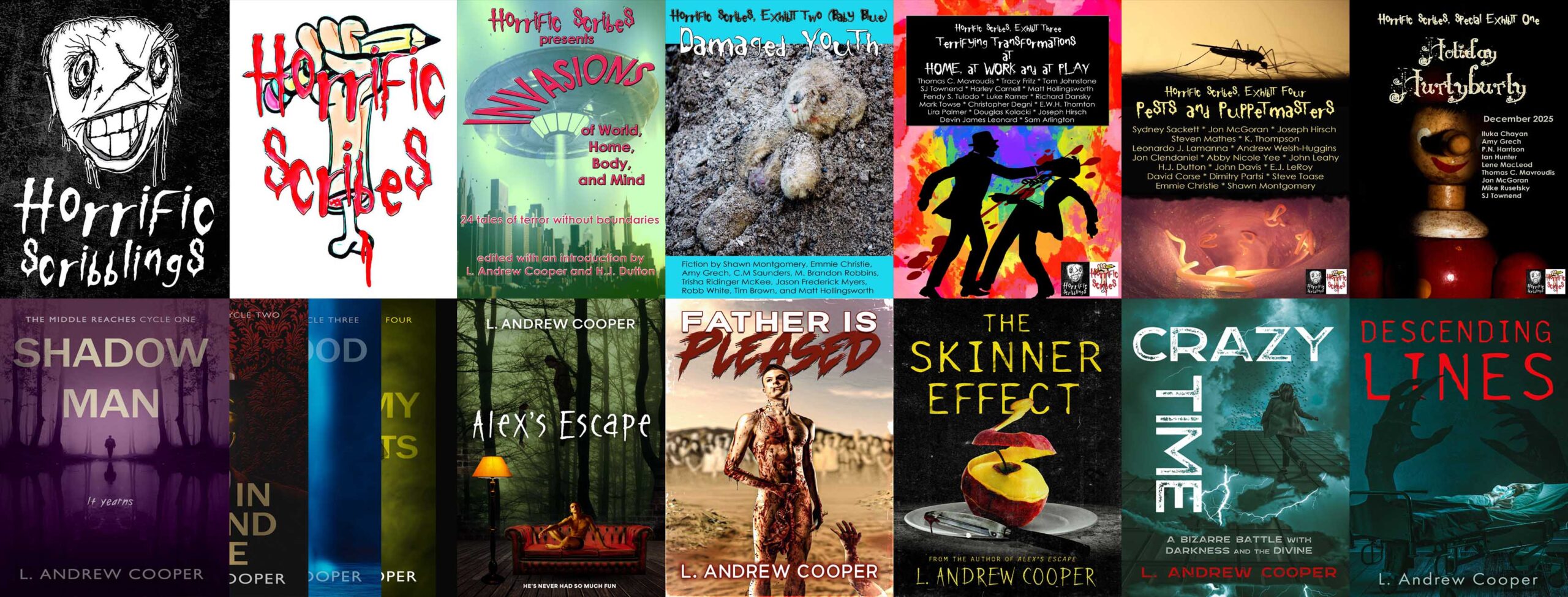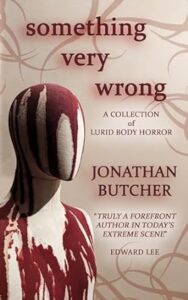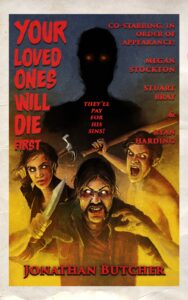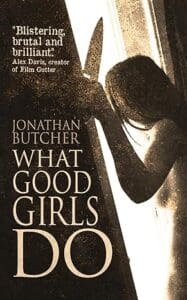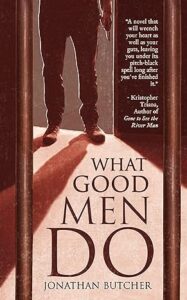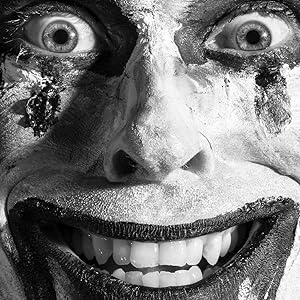Spotlight on Author Jonathan Butcher: Something Very Wrong and Your Loved Ones Will Die First (2024)
Scary, funny, and delightfully twisted extreme horror writer Jonathan Butcher shares some thoughts on his Splatterpunk Award-nominated story collection Something Very Wrong and his forthcoming novella Your Loved Ones Will Die First.
Something Very Wrong
Nobody is safe. No body is safe.
A gruesome fetish experiment…
A bloodless gorefest…
A beast of flesh and metal…
A sensuous parasite…
Endless skin-warping atrocities.
Read on. Give in to the inner voices, begging to reconfigure your meat and muscle. Because something here is very wrong.
From the author of the indie hit What Good Girls Do come nine gut-churning stories of anatomical horror, including three brand-new, never-before-published tales.
Your Loved Ones Will Die First
They’ll pay for his sins.
Ethan Stone has everything: money, a beautiful wife, and a powerful family name. But during a shocking night of ritualistic violence, someone—or something—from his past wants to snatch away the people he loves. Will he learn the truth and end the massacre, or is there no escaping the past?
Your Loved Ones Will Die First is an extreme horror, a race-against-time thriller, and a supernatural mystery, bound together by torn flesh and not-so-innocent blood.
Interview
1. Something Very British? In Something Very Wrong, at the beginning of the story “Family Recipe,” you contrast expectations of the American Deep South with the “real south,” Cornwall, and just in case the title “Beneath the Moor” isn’t enough, an early paragraph of that story specifies that a character is looking at the “British countryside.” Like Ed Lee with some of his uniquely American grotesquerie, to what extent do you see yourself crafting distinctly British horrors? Do you think Britishness is part of your brand? Why or why not? The transatlantic extreme horror movement owes so much to Clive Barker’s early work—how do you feel about the extreme scene in the U.K. now?
JB: While it’s fun to tell uniquely British stories, most of my readers come from the United States, so I’m not attempting to plant any flags – I’m just trying to write decent horror!
It’s important for any author to “write what they know,” but I’ve worked abroad, and I’m also married to an American, so I have influences that go beyond the U.K. In fact, all three of the longer works that I’m hoping to release this year take place in the U.S., so it’s lucky that I have an American wife who can point out any Britishisms that may sneak into the stories!
As for the British extreme scene, I’ve been happy to see names like J. Boote, D. E. McClusky, and Sean Hawker writing some brilliantly vile stories in the last couple of years and getting the recognition they deserve. I grew up reading Clive Barker, Graham Masterton, and James Herbert, so I am certainly a fan of British splatter.
2. Bodies Very Wrong. In the “Author’s Note” that launches your collection, you write of your love of body horror that goes back to your childhood viewing of The Thing (I’m assuming Carpenter’s 1982 version). The physical monstrosities of that film have been linked specifically to the (very early, not-yet-named) AIDS epidemic and virtually every kind of paranoia imaginable, Cold War and otherwise. Do you imagine something wrong metaphorically beneath the gruesome physical transformations your stories depict? “Alternate Route,” for example, seems to have some philosophical implications about bodies and technology. What do you think that story—and any others you care to comment on—has to say about relationships between bodies and the world?
JB: The horror genre is ripe for social commentary and philosophical exploration, and body horror offers some great opportunities for this. However, with almost every tale in that collection, I have a confession: I was writing purely for fun. “Alternate Route” is perhaps the exception to this, because the concept of A.I. has become impossible to ignore. I’d had an idea I wanted to write for a long time, about a GPS that goes rogue and decides to change a driver’s journey to one of its own malicious choosing. With the rise of ChatGPT and the like, I found a way to take the concept further and explore (in a very light-touch, splattery way) how a computer’s moral thinking might differ from our own.
I always try to write beyond what’s become the typical “Here’s an evil man doing evil things, isn’t he gross?” kind-of tales, but regarding body horror, I just think it allows for a more direct path to horrifying a reader: if the horror is inside the human body, then there really is no escape.
3. Like Us. “A Threesome with Caricia” might be the most twisted tale in the volume, and since I don’t want to give away the twisted twists, I’ll just mention that, as protagonist Stephen gets drawn into the titular threesome by Caricia’s sister Natalya, Natalya explains he’s right for them, saying, “Because you’re different. You’re like us.” This attempt to bond brings to mind the “one of us” mentality of the freaks in Tod Browning’s film Freaks (1932), early cinematic body horror. To what extent is body horror putting a spotlight on what’s physically different, perhaps unbearably, unimaginably so? Do you think body horror involves more attraction to or repulsion from the physically outré? Why?
JB: I think that a reader’s response to body horror depends more on their preferences than the content itself. For me, there is pleasure to be found in disgust, and I have an attraction to atrocity. I’ve never really been able to pin down what it is about body horror I love so much, because if I did, I’d end up sounding like some bio-nihilist who wants the human body to explode, grow new limbs, and melt…
As for your question about whether it puts a spotlight on physical differences, for me personally the joy of body horror is in the transformations people make into otherworldly, distorted new forms, rather than the perceived horrors of being different. I just want to see some new human shapes and rearrangements…
4. Genital Bookends. Something Very Wrong begins with “Drilldo” and ends with “Last Night’s Gig,” both of which involve genital… if not mutilation, at least extreme distension, and it serves up some nice genital horror right in the middle, too, with “Dripping Wet.” It’s all properly disgusting, but perhaps because, as Monica J. O’Rourke informed me, I’m a sicko, I also find it… pretty darned funny. What’s the attraction of writing about genital catastrophe? What makes these stories work? Finally, assuming I’m not the only sicko involved in this operation, why do you think the genital zone of body horror can play so readily for laughs?
JB: There’s a level of childish play involved in extreme horror and body horror, and for some reason, there’s still plenty of taboo involved in our “downstairs areas.” Unless I’m writing something more serious like my “Elizabeth” books (What Good Girls/Men Do), any genital destruction I write about tends to have some humour involved. I don’t often build a story around a scene of penile or vaginal gore, but if it happens to fit, then so be it! The human body is an amazing thing, but our preferential attitudes towards different parts of it verge on the ridiculous, so I’m all about equality: I’m just as happy to demolish an arm as I am an anus.
5. Morality Play. Many stories in Something Very Wrong revolve around characters guilty of various transgressions, often sexual transgressions such as infidelity. Are the horrors that visit them punishments for their transgressions? In “ChaGrin,” you even play with the idea of psychomachia (physical manifestations of good and evil providing the protagonist with advice), though in a novel and grotesque way. What inspired this representation of “moral” reasoning? Does a moral sensibility lurk behind your tales more generally? If so, how would you describe it? If not, is it fair to say that morality itself edges into the absurd? Why or why not?
JB: I find human ethical conflict intriguing, but I don’t really believe in the concepts of good and evil, and metaphysics in general disinterest me. The worst part of human nature is the selfish urge that disregards consequences for others, so I think that as a horror author it’s my duty to explore characters’ thought processes whenever they consider doing something transgressive. Even the worst serial killers have limits – for example, the necrophile serial killer Ted Bundy would never discuss the child he killed – so I think that considering morals and regret can make for a compelling read in horror stories. I don’t think that I write typically moral tales, but at the same time, I’m not a nihilist, so if I take a certain amount of pleasure in ruining a heartless scumbag or two, so be it. However, I believe that we live in a state of chaos and that life and death have no concern for the individual, so readers should never expect a happy ending from me. If they get one, it’s just their lucky day.
6. Immorality Pays. For your forthcoming novella Your Loved Ones Will Die First, the description begins, “They’ll pay for his sins,” so the previous question continues to be relevant. Is the someone or something from Ethan Stone’s past somehow righteous? Does shedding “not-so-innocent blood” make the shedding more acceptable? From an artist’s and/or reader’s perspective—more enjoyable?
JB: I’m not going to discuss the details of whatever my main character may or may not have done – that’s a big part of the storyline! I think that the average extreme horror fan is fine with any kind of blood being spilled, as long as it’s done in a wild, creative way. I prefer characters to have more personal motives, so while they may be convinced that what they’re doing is somehow “righteous,” that doesn’t necessarily mean that I agree. As I mentioned before, there aren’t many real-life people or fictional characters who think that they are the villain – the ghastliest abusive slaughterers can often still justify what they’re doing, at least in their own heads.
7. First Class. Something Very Wrong falls into the body horror niche of extreme horror, but Your Loved Ones Will Die First seems like it belongs somewhere else on the extreme spectrum. How would you classify it, and why? What are some examples of extremes that readers can look forward to? To which of your other works does it best compare?
JB: There are definitely scenes of body horror in this story, but my main aim was to produce a fast-moving tale that allowed my guest authors to contribute a scene of devastating gore. It’s part thriller, part horror, and all extreme, and having three other brilliant authors – Megan Stockton, Ryan Harding, and Stuart Bray – along for the ride really made it a fun project to work on. Each of them was given an important character to dispatch, and each of them did so with gusto. I’d say that it has the pace of What Good Girls Do, the crazy set-pieces and flashbacks of Chocolateman (but without the poop), and a demented twist all of its own.
8. Supernatural Returns. Your Loved Ones Will Die First includes “supernatural mystery” as part of its recipe. Past crimes haunting the present—and/or the return of the repressed—have been a staple of Gothic/horror fiction since its inception, so you’re drawing from a deep well. What were this story’s specific influences, especially the supernatural dimensions? How does this story blend the supernatural with what people take to be natural or “real?”
JB: Writing something with supernatural elements for a splatterpunk/extreme horror audience can be a tricky task, because quite often these books are set firmly within the real world. The main influence for this story is going to sound incredibly arrogant: it was my own work, which I tried to write when I was 17, but which I was not yet a good enough writer to finish. However, the central paranormal idea has always stuck with me, and I’m glad it’s now become a book (and, depending on its success, who knows? Perhaps a series). So the supernatural stuff has nothing to do with demons, werewolves, vampires, etc – it’s mainly just a vehicle for me and my guests to use to write some eerie and ultraviolent scenes.
As for the precise nature of that idea, I’ll leave that for my readers to find out when they open the book.
9. Access! How can readers learn more about you and your works (please provide any links you want to share)?
JB: I’m on Facebook most often, but I’m getting better at posting to TikTok (@drbutchermd), and my writing is available in all formats on Amazon and godless.com.
I’m running an Indiegogo crowdfunding campaign to support the publication of Your Loved Ones Will Die First and offering some very nice perks. Please have a look: https://www.indiegogo.com/projects/your-loved-ones-will-die-first#/ The campaign ends April 16th, and anyone who pledges will receive their book a FULL MONTH before it is available on Amazon. The top tier perks have already been snapped up, but there are still signed limited hardbacks, signed paperbacks, and e-books available.
About the Author
Jonathan Butcher is a Splatterpunk Award-nominated author who lives beside the ocean in Southwest England with his wife and fellow horror author Michelle von Eschen (pen name). He is best known for his transgressive extreme horror novella What Good Girls Do, but he has written three other novels, a horror collection, and numerous short stories/novelettes, and intends to publish three new books this year. In his spare time, he enjoys hiking and drinking fine beer and wine with his wife and friends, and living a life of horror through movies, video games, books, and his own hideous tales. He writes about the things that frighten, unsettle, disgust, amuse, or disappoint him, and he has a Master of Studies in Crime and Thriller Writing from the University of Cambridge. He can’t imagine a life without writing.
Review of Your Loved Ones Will Die First
What I love about Jonathan Butcher’s Your Loved Ones Will Die First is that, especially in the tradition of giallo films but also slashers, Butcher has designed a brilliant overarching plotline to accommodate what he rightly calls in our interview “set-pieces,” a term more common in film discussions but perfect to describe the violent sequences in this work of prose fiction, scenes that are perhaps so violent that they would ironically qualify as unfilmable (at least to be viable in most world markets). Butcher describes his plot as a “vehicle” for “ultraviolent scenes,” three of which were written by guest authors Megan Stockton, Stuart Bray, and Ryan Harding. Each guest turns in a superlative performance, helping to make the novella as a whole a disturbing and unstoppable read.
Though the plot is primarily a vehicle for scenes of ultraviolence, the book only works because the plot is also good. The main character finds himself witnessing the gruesome deaths of his family members for reasons that may or may not relate to some sin from his past—which even puzzles him—so he must try to prevent further mayhem and solve the supernatural mystery at the same time while the deaths pile up. While I didn’t find all the twists surprising, I was nevertheless captivated by the protagonist’s desperate quest to stop the slaughter along with the gradual revelation of the past that brought him to the present-day point of crisis. Between the moments of extreme gore, I rarely had time to catch my breath.
As for the extreme violence, it works as well as it does because it never quite goes over the top into humor or farce. It’s out there, but all the authors seem to take themselves seriously enough to maintain the novella’s tone and atmosphere of dread. The result is, frankly, one of the most grippingly violent books I’ve ever read, and I’ve read lots. Much genital mutilation is on display (and not just from Ryan Harding, who is a master of such stuff), but the violence is varied enough never to become repetitive or boring. It is, in fact, highly creative, artistically triumphant, at least from the point of view of someone like me who sees grand guignol as art.
In short, if you want a lightning-fast read that takes you to new depths of horror, I can’t recommend Your Loved Ones Will Die First enough. Congratulations to Jonathan Butcher and his collaborators. I look forward to reading more from you soon.
